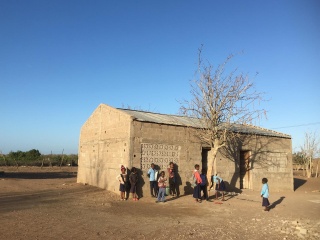Climate crisis causes food insecurity in Mozambique
Mary’s Meals’ school feeding programme is having a positive impact on Mozambique’s children amid drought, flooding and cyclones.
Like its neighbours Malawi and Zimbabwe, Mozambique is facing a climate and food crisis. The country is grappling with prolonged dry spells, extreme weather events and above-average temperatures.
These conditions are destroying agricultural production, killing crops and creating further food insecurity for families already struggling with hunger.
The consequences of the climate crisis
For Cara and Roberto from the Mozambique School Lunch Initiative (MSLI), our partner that helps deliver school meals in Mabalane District, there is no underestimating the enormity of emergency Mozambique is facing.
“It's not a risk of a crisis, it is a crisis already,” Cara explains. “It's been a chronic crisis for a while now. It's not a new thing. Even if sometimes the rains come, it’s only a little bit. People try to produce their crops, but then something else happens and the harvest isn't very good.”
Like much of Southern Africa, Mozambique is suffering from long-lasting El Niño-induced drought. It has left the land near impossible to farm, resulting in below average harvests. Other extreme weather events such as flooding and cyclones are also devastating the land, its food production and the availability and cost of resources.
Heavy rains in South Africa and Zimbabwe cause flooding as they flow into Mozambique via the Limpopo River. Many people live along the low-lying riverbed and are reliant on farming. Flooding is wiping out any yields they have managed to grow, making farming extremely challenging. Maize is failing to grow, and there has been up to a 35% reduction in national maize production in recent years.

The impact of drought on hunger and health
“Since the drought we had in 2016, things really never got better,” Roberto says. “We’ve had drought, we’ve had cyclones and a lack of rain in many different regions. We normally expect rain from September, but now it doesn’t rain until maybe the end of December or January, February. The country is suffering so much with a lack of rain. That is one of the biggest issues for families.”
“Even when they do farm, everything will just dry up, because when the rain stops, it stops completely. There’s no water in the rivers and ponds so their crops will die. If they get any crops, it’s only enough for about three months. We know it is going to be very difficult. The poor are going to suffer more.”
Families in Mozambique are increasingly vulnerable to acute food insecurity and are taking desperate measures to eat.
“I asked one of the schoolchildren what she eats when she is not at school,” Roberto adds. “She explained that at weekends they go to the dry riverbed and collect black river roots or sweet potato leaves and that will be the food for the day.”
Drought is also causing health concerns, with the stunting rate among children under five remaining around 37%.

Mary’s Meals represents a lifeline for children and their families
“The country is struggling,” says Cara. “One of the biggest issues for families is that they are used to working their farm, but they cannot do anything now, everything dries up.”
“Mozambique relies on imports, mainly from South Africa, but the products are too expensive for these families. They don’t have money to buy things because they cannot farm. Instead, they rely on making charcoal. They have to cut trees and make charcoals and sell them. It’s hard work and they don’t make a lot [of money].”
“Mary’s Meals is the only safety net these kids have, and it has a huge impact on their whole family. They need help right now.”
Every school day in Mozambique, more than 5,000 children living on the front line of climate change attend their local place of education where they receive Mary’s Meals. Although the school-feeding programme is already making a positive difference to thousands of children, many more are still in need of daily meals.
It costs just £19.15, €22, $25.20 USD or $31.70 CAD to provide a child with school meals for an entire school year. Mary’s Meals is currently serving nutritious daily meals to more than 1.5 million children in schools across Southern Africa. Now, more than ever, your support is needed to spread the word about our work and the emergency in the region. With your support, we can reach many thousands more children waiting for our daily meals.
Steph Bungay is our Content Officer and works with our partners to share the stories about how our work supports millions of children around the world.
